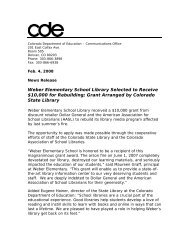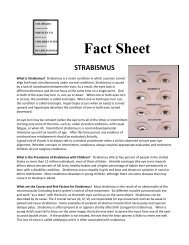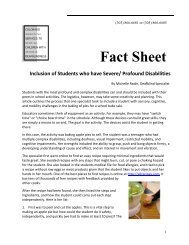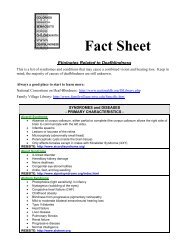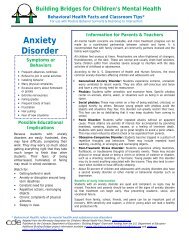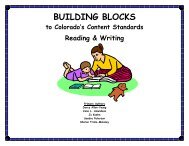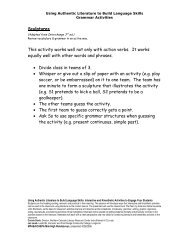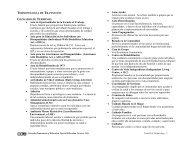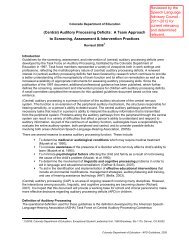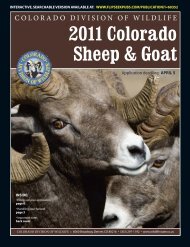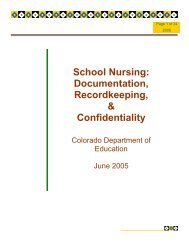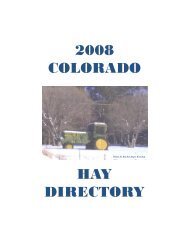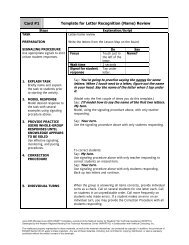ONLINE EDUCATION INTERIM REPORT - Colorado Department of ...
ONLINE EDUCATION INTERIM REPORT - Colorado Department of ...
ONLINE EDUCATION INTERIM REPORT - Colorado Department of ...
You also want an ePaper? Increase the reach of your titles
YUMPU automatically turns print PDFs into web optimized ePapers that Google loves.
18<br />
effectively. To the extent that local<br />
districts serve as statewide authorizers <strong>of</strong><br />
online programs, they must demonstrate<br />
the capacity to operate at this larger<br />
scale.<br />
Districts may also be able to partner<br />
with other districts to provide assistance<br />
with the oversight <strong>of</strong> online programs.<br />
For example, Douglas County School<br />
District has contracted with Hope<br />
recently to help them develop policies<br />
and procedures to oversee their learning<br />
centers. Douglas County district leaders<br />
will help them develop systems to<br />
ensure higher standards in management<br />
and improve compliance with applicable<br />
rules, regulations and reporting<br />
requirements. This relationship could<br />
address shortcomings in capacity at Vilas,<br />
as alleged by the State Auditor.<br />
Who is Accountable and how to Manage<br />
Multiple Layers <strong>of</strong> Authority<br />
Many <strong>of</strong> the issues raised in the audit report<br />
emerged from complex relationships between<br />
the state, a local district, a charter holder, and<br />
multiple subcontractors operating across the<br />
state. The state does not have a clear or direct<br />
role in overseeing how a district works with<br />
a charter school under local supervision. The<br />
State Board <strong>of</strong> Education does address charter<br />
applicants who appeal their charter’s denial by a<br />
local district and also rules on whether a district<br />
can maintain its “exclusive authority” to charter.<br />
However, other than district accreditation,<br />
and the application <strong>of</strong> all other education rules<br />
and laws, there is no clear role for the state<br />
to intervene when problems arise related to a<br />
district’s oversight <strong>of</strong> an operating charter school.<br />
Similarly, when problems or confl icts occur in<br />
the administration <strong>of</strong> contracts between a charter<br />
operator and a subcontractor, it is not clear what<br />
authority, tools, and obligations a local school<br />
district or other charter authorizer has at its<br />
disposal to intervene in the situation.<br />
It is clear that online schools, like all public<br />
schools, must follow appropriate procedures<br />
in the administration <strong>of</strong> public funds as well<br />
as comply with all applicable education,<br />
health, safety, and civil rights laws. <strong>Colorado</strong><br />
policymakers may need to adjust existing<br />
oversight structures, clarify how to apply existing<br />
procedures and provide additional resources<br />
to strengthen the oversight <strong>of</strong> alternative<br />
programs like online education. As the 2007<br />
state legislature considers various changes to<br />
education accountability, it will be important<br />
for lawmakers to include these ideas in their<br />
deliberations. The complexity <strong>of</strong> these issues,<br />
however, are likely to require a more detailed and<br />
deliberative discussion than can be accomplished<br />
this legislative session. A process should be<br />
pursued that allows for a thoughtful, inclusive,<br />
and effective strategy to address these issues.<br />
5. ACCESS<br />
Restricting Funding to Students Previously<br />
Enrolled in Physical Schools<br />
Concerned about signifi cantly increased online<br />
student enrollment and the associated state<br />
fi scal costs, the legislature several years ago<br />
limited state funding to online students who<br />
were previously enrolled in a public school and<br />
who had completed at least one semester (C.R.S.<br />
22-33-104.6(4)). Statutory exceptions to this<br />
formerly included 135 funded student slots. The<br />
legislature eliminated those slots and authorized<br />
the State Board <strong>of</strong> Education to defi ne and grant<br />
such exceptions for students who were removed<br />
from school for extraordinary circumstances.<br />
The exemptions remain in statute and rule, and<br />
approximately 300 students per year are exempt<br />
and allowed funding. Kindergarten and First<br />
Grade online students are also exempt from the<br />
funding restriction.<br />
As mentioned in the report’s at-risk defi nition<br />
section, the regulatory exemptions include<br />
students who are habitually disruptive, habitually




